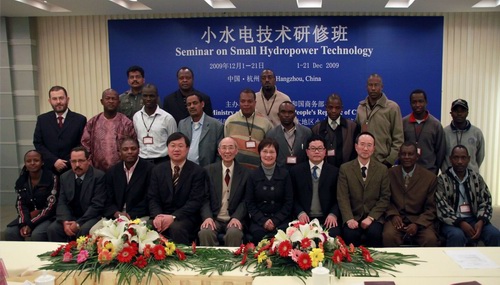---On December 1st 2009, entrusted
by Chinese government, the opening ceremony for 2009 Seminar
on Small Hydropower Technology was held at Hangzhou Regional
Center for Small Hydropower (HRC). Present at the opening
ceremony were 18 participants from more than 10 countries,
such as Algeria, Guinea, Ethiopia, Seychelles, Uganda,
Kenya, Benin, etc. Due to the flight changes, several
participants are still on their way to China.
Ms. Cheng Xialei, director of HRC,
Mr. Zhu Xiaozhang, honorary director of HRC, Mr. Xu Jingcai,
deputy director of National Research Institute for Rural
Electrification, and Mr. Huang Jianping, deputy director
of National Research Institute for Rural Electrification
presented in the ceremony. Mr. Pan Daqing, chief of Foreign
Affairs and Training Division of HRC presided over the
opening ceremony.
On behalf of HRC, Ms. Cheng Xialei,
director of HRC, expressed her expectation on this seminar:
share and exchange the Chinese experience on SHP, stimulate
the exploitation and utilization of small hydropower resources
in developing countries, deepen the cooperation between
China and other developing countries, and strengthen our
friendships.
Mr. Zhu Xiaozhang, honorary director
of HRC gave a brief introduction on the development in
SHP Technology in China. He referred to a famous Chinese
proverb: "to teach one how to fish is better than
just giving one some fish", which is how Chinese
government performs to help developing countries. Meanwhile,
he encouraged participants that in order to contribute
their own strength to the development of SHP, they should
consider the actual situation in their own country while
learning and exchanging technology on SHP.
On behalf of all the participants,
Mr. Steven from Zambia expressed his gratitude to the
Chinese government, the Chinese people and the organizer
HRC. The other participants articulated that hopefully
through this seminar, they can learn and exchange knowledge
and skills on SHP on one side, and acquire financial and
technical support to exploit the water resources in their
country on the other side.
It is estimated that 26 participants
from 14 countries will attend this 21-day seminar. (2009-12-03)




